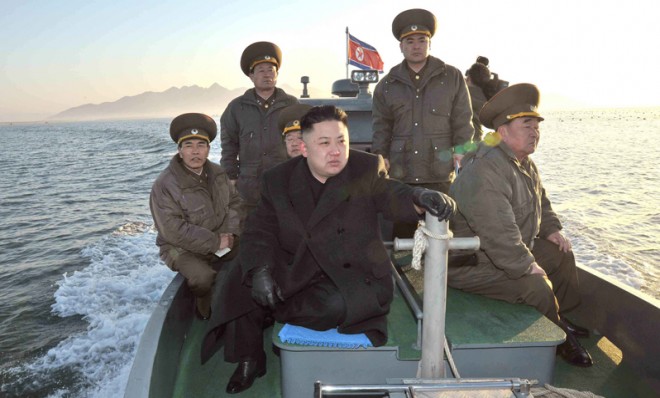How America should handle the nuclear threats of Kim Jong-un
It's time for the U.S. to state clearly and loudly: If you nuke our allies, we will annihilate you

A free daily email with the biggest news stories of the day – and the best features from TheWeek.com
You are now subscribed
Your newsletter sign-up was successful
Kim Jong-un is not a happy man. Dennis Rodman has finished his visit, and in his place, new U.N. sanctions have arrived. And to show the world just how unhappy he is, Kim has thrown a nuclear temper tantrum. In recent days, he's threatened to annihilate the United States, he's cut off two-way communications with South Korea, and he's announced an end to the July 1953 armistice that halted the Korean War.
Faced with the threat of a nuclear holocaust, it's easy to allow fear to pollute our thinking on North Korea. But the propagation of fear is Kim's singular intent. He believes that by scaring us, he can drive the United States and South Korea back to the negotiating table — a table already laden with our diplomatic and economic concessions. In this blackmail, Kim is following an aged and successful playbook. For many years, North Korean threats were rewarded with aid and diplomatic recognition. This policy was a disaster for the West; it buoyed the North Korean plutocrats, failed to alleviate the unparalleled suffering of the North Korean people, and encouraged North Korean hostility against the South.
Our weakness was North Korea's victory. So it shouldn't surprise us that Kim is at it again. And although the nuclear dynamic obviously makes the stakes very high, we mustn't fall into the familiar trap of appeasement. Instead, we must alter Kim's strategic calculation.
The Week
Escape your echo chamber. Get the facts behind the news, plus analysis from multiple perspectives.

Sign up for The Week's Free Newsletters
From our morning news briefing to a weekly Good News Newsletter, get the best of The Week delivered directly to your inbox.
From our morning news briefing to a weekly Good News Newsletter, get the best of The Week delivered directly to your inbox.
The North Korean leader must be made to understand a simple truth: Blackmail will meet unwavering resolve.
So far, the U.S.-RoK response to Kim's latest threats has been good. Alongside new sanctions, Key Resolve, the major annual US-RoK military exercise, has commenced as planned. South Korea's newly elected president is talking tough. We're showing no signs of backing down.
This is a start, but it's not sufficient. What we really need is American strategic clarity. While everyone knows that the United States would fight alongside South Korea in the event of a North Korean invasion, this reality carries insufficient weight in the age of nuclear proliferation. We need an updated deterrent posture — one that's clear, robust, and devoid of political niceties. Something like this:
In the event of an attack by agents or proxies of the North Korean state against the Republic of Korea, the United States will render full spectrum support to our ally. Further, any nuclear attack, or attempted nuclear attack, against the United States or South Korea, by agents or proxies of the North Korean state, will be met by nuclear retaliation from the United States.
A free daily email with the biggest news stories of the day – and the best features from TheWeek.com
Kim and the hardliners in the North Korean ruling elite must be made to realize that a nuclear attack on the U.S. or its allies would lead to something close to the North's immediate annihilation. Like us, the North Korean elite don't want to die. Death, after all, would mean an end to the extravagant luxury to which they have long been accustomed.
This crisis isn't taking place in a localized vacuum. Successfully deterring North Korea isn't just important for the Korean peninsula. It's a paramount demand of international security in the 21st century — most notably with regard to Iran.
As the Iranians continue their pursuit of nuclear power, the United States must be able to show Tehran very clearly that nuclear blackmail does not pay. In part because of Iran's relationship with terrorists who possess a flexible relationship with death, the stakes posed by an Iranian nuclear weapon are severe. And if the United States is seen as rewarding North Korean nuclear blackmail with concessions, then you can guarantee Iran will take notice.
The aftershocks of U.S. policy on this small Asian peninsula will be felt around the world. Let's make sure our policy is the right one.
Tom Rogan is a conservative writer who blogs at TomRoganThinks.com.
-
 Political cartoons for February 12
Political cartoons for February 12Cartoons Thursday's political cartoons include a Pam Bondi performance, Ghislaine Maxwell on tour, and ICE detention facilities
-
 Arcadia: Tom Stoppard’s ‘masterpiece’ makes a ‘triumphant’ return
Arcadia: Tom Stoppard’s ‘masterpiece’ makes a ‘triumphant’ returnThe Week Recommends Carrie Cracknell’s revival at the Old Vic ‘grips like a thriller’
-
 My Father’s Shadow: a ‘magically nimble’ film
My Father’s Shadow: a ‘magically nimble’ filmThe Week Recommends Akinola Davies Jr’s touching and ‘tender’ tale of two brothers in 1990s Nigeria